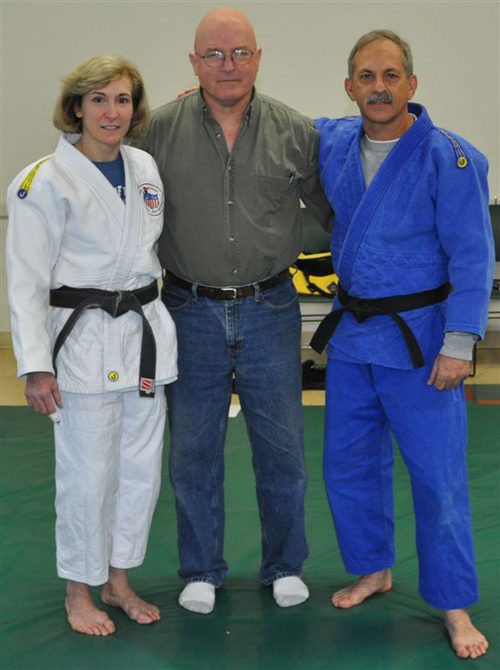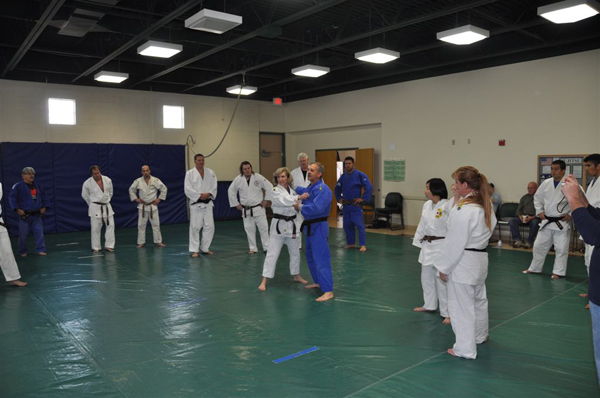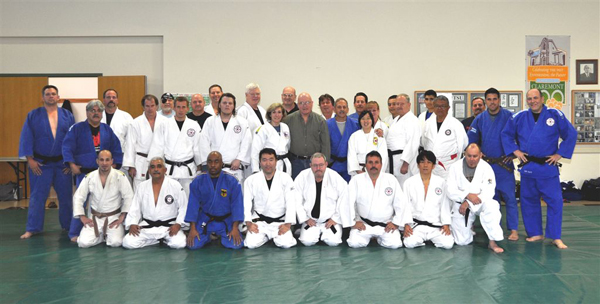The 2010 USJA/USJF Winter Nationals Coach Certification Clinic is now history. According to our host, USJA President Gary Goltz, this was the best attended Winter Nationals coaching clinic. Since I was one of three clinicians, I can attest that our group was highly motivated, engaged, and eager to learn “new stuff.” Usually there is at least one naysayer present at all coaching clinics. That’s the guy who, no matter how much evidence is given to him, openly fights you tooth and nail when it comes to alternative methods of instruction. This time around, we had no naysayer, at least not an overt one. That’s progress.
For today, I’d like to talk about two issues that affected many of the participants: boredom and frustration. It seems that coaching clinics have developed a reputation that is unfortunate: they are boring. And boring most of them are. They are boring primarily because content seems to be the same: first aid, legal issues, rules, and stuff not suitable for grassroots Judo. Therefore, many of our participants arrived forewarned that it was going to be boring. This time around, however, we surprised them. We gave our coaches more pertinent, new information than they could probably handle. One young coach, who came in prepared to be bored was so jazzed by what he learned at the clinic that he took the concepts he learned, connected the dots, and that same night according to him, “taught the best MMA class I had ever taught.” Now that’s what a coaching clinic should be like. Pertinent stuff that you can and want to use right away.
By the end of the day, it was clear that although the day was very fruitful, one very frustrating fact remained. What good was all this new stuff if sensei wouldn’t allow any of it on the mat? Pressed for time, we didn’t handle “how do we get sensei to change” as adequately as we could have. So here’s a better attempt at discussing the problem.
For starters, sensei should be at the clinic, especially if new methods of instruction, like Kelly’s Capers or the Lafon approach to teaching beginners, are being covered. Sensei’s club may have to send him on an “all-expenses paid vacation” to a coaching clinic every so many years.
One of sensei’s assistants could present him with an article to read or a video to watch. The assistant should say something like this. “Sensei, I came across this interesting material. I thought that perhaps we might start trying some of it within our class. What do you think, sensei?” With this statement, you have suggested that the program needs to be improved, and you are offering an option that is appealing. You might also point out that membership has stalled or decreased and that a new approach might be the solution to better retention and growth. If sensei gives his approval, great. If he doesn’t, ask, “Why not?” Challenge him in a respectful manner. Find out what his objections might be. This initial approach begins what should be a continuing intellectual dialogue to convince him to change. In essence, you are mentoring sensei, not necessarily in his Judo but surely in the way his Judo is presented. So don’t quit after the first “no” or the first “I’ll think about it.”
Another approach is to not ask for permission, but to simply take charge of leading classes in another direction. A slow, gradual introduction to a new warm-up exercise, situational drill, idea, or concept is much safer than a complete overhaul of the program. Sensei may not even recognize what is happening, but the players surely will.
When sensei gets sick, or goes on vacation, or misses practice because of his real job, that’s the time to act. Once again, without asking for permission, take charge and work those new drills and exercises to death. Since I am positive that your players and parents will dig the new stuff, the number of people in favor of change within your club makes it more difficult for sensei to fight it. Once sensei finds out how good the classes were in his absence, he may get the message.
If sensei doesn’t get the message, he risks fragmenting his club. This is not all that bad because what usually happens is assistants go off on their own and run their own clubs. Having more clubs doing Judo is always a good thing, even if sensei remains stubborn.
Finally, hosting a clinic within your own club may lead to change. If sensei won’t go to a clinic, the clinic needs to go to him. If you do host a clinic, make sure it’s one that will positively impact your program. Host a clinician that makes Judo fun and dynamic. Make sure your kids and adults are present. Remember that they will start putting pressure on sensei for more fun stuff and rational training drills. Remember to engage and challenge sensei intellectually.
I realize that senior rank is a powerful impediment to better methodology. I also understand that too many middle managers (1st-4th Dan) fear upper management (head senseis) often for no good reason. Back when I was an ikkyu, I was bored out of my gourd with our “never, ever changing”warm-ups. I finally couldn’t take it any more, so I approached my sensei (7th dan) and asked if I could lead the warm-ups and introduce some new exercises. He gladly gave me permission to do so. Imagine that! No long-term changes came from my new exercises at my dojo, but that act of asking for change eventually encouraged me to go my own way and do my own thing, still young and still an Ikkyu.
Unlike the pope, senseis are not infallible, notwithstanding their high rank in Judo. To say that junior ranks have no input in the conduct of classes is nonsense. To suggest that senseis shouldn’t even be approached is detrimental to our sport. For this line of reasoning I’ve been called irreverent. Well, I’d much prefer to be called irreverent than to be reverent and see my sport die. I hope that many of you middle managers out there feel the same way. So get on your horse, and charge full steam ahead. Save the sport even if sensei goes ballistic.




I agree with the winds of change that need to happen to carry our sport. One major issue is that in order for Judo to grow, we need to bring in new blood – students that have not even heard of the sport. While teaching senseis at clinics about the new methods of coaching is important, I think there should also be a class on marketing our sport. How to introduce new people to your dojo etc. No matter how good the sensei is, if the club does not market itself, it will ultimately have to close its doors.
I agree about saving the sport. I have informed everyone and anyone that I will fundamentally try to change the sport and grow it any cost – seriously, ANY cost. I may step on toes and piss people off along the way, but you can punish me after I resurrect the table scraps for “Upper Management” to fight over again.
Keep up the good work Gerald!
I find that there is often a gap in goals amongst the judoka and senseis around the topic of competition. I’m an actively competing brown belt, and am sometimes a little disappointment at the slow pace of training sessions when I’m preparing for an upcoming competition. Thank you for the excellent advice on talking to my sensei about it. I am lucky in that my sensei is open to new ideas and tries different approaches to training all the time.
I agree wholeheartedly that we need to create a course on marketing our Judo clubs. We were on the verge of doing just that in the USJA five years ago, then politics intervened, our coaching committee was terminated, and the course on marketing died an instant death.
For a while I practiced with a club that was traditional in the worst sense. Every. Single. Practice. was identical. 20 minute warmup, lots of uchi-komi, maybe some randori at the end. Extremely little actual throwing during practice. The one time I taught class for them, the students were all so gob-smacked by what I was trying to teach. Simple stuff like moving off-line when practicing, throws to completion, throws beyond the 6 or 7 they continually practiced, stuff like hane-goshi, some foot sweeps, etc. I was barely able to accomplish anything because it was such a massive paradigm shift.
It was the best of the coaching clinics we’ve had at the Winter Nationals. It was more open with new concepts being presented as opposed to a bunch of people just sitting through clinic to get a coaching badge. I was very encouraged and hope to see more innovation looking ahead to next year’s event. Thanks for your help Gerald.
Thanks for the article on a lighter note is big Bill wearing the “judo booties”
Bill was wearing the deluxe model!